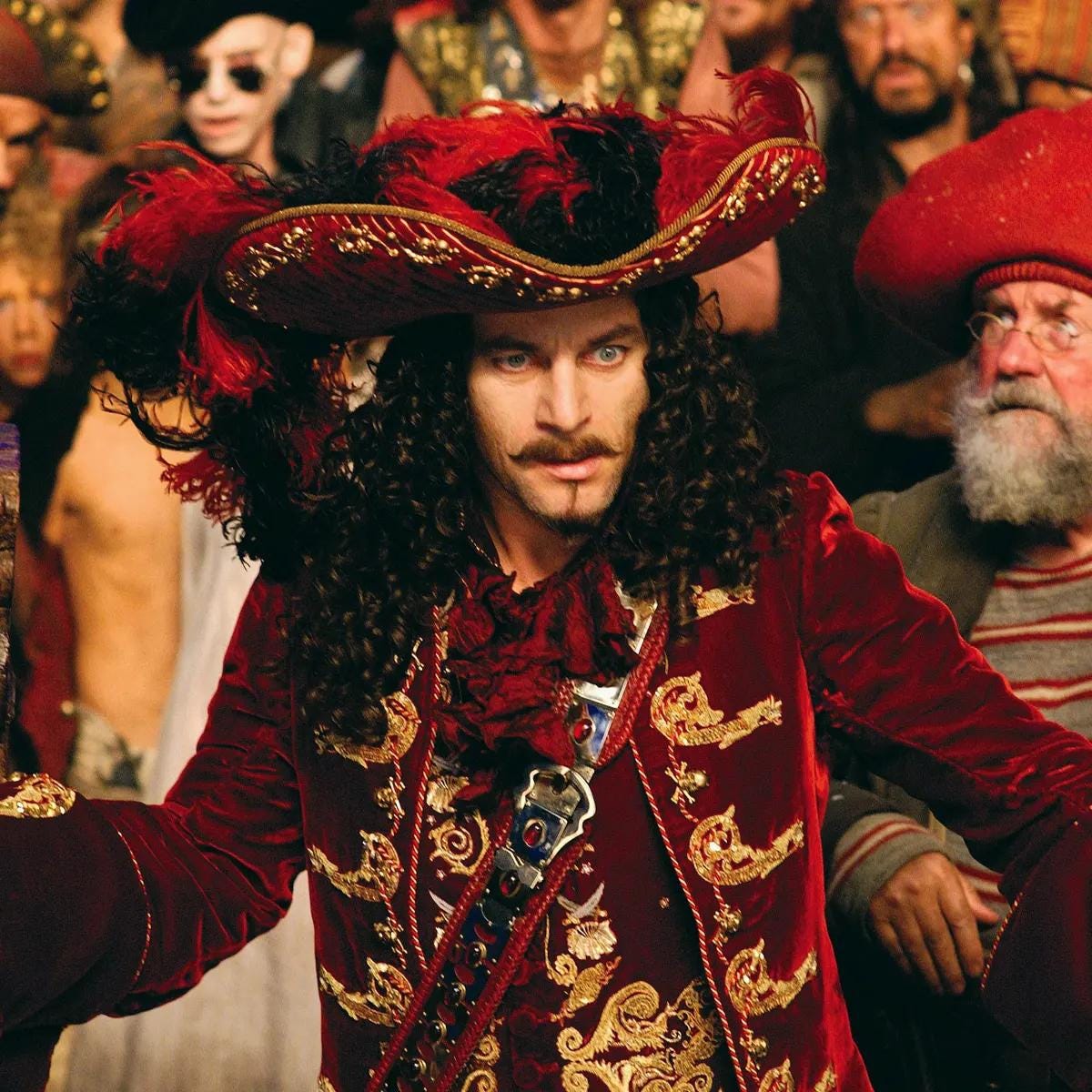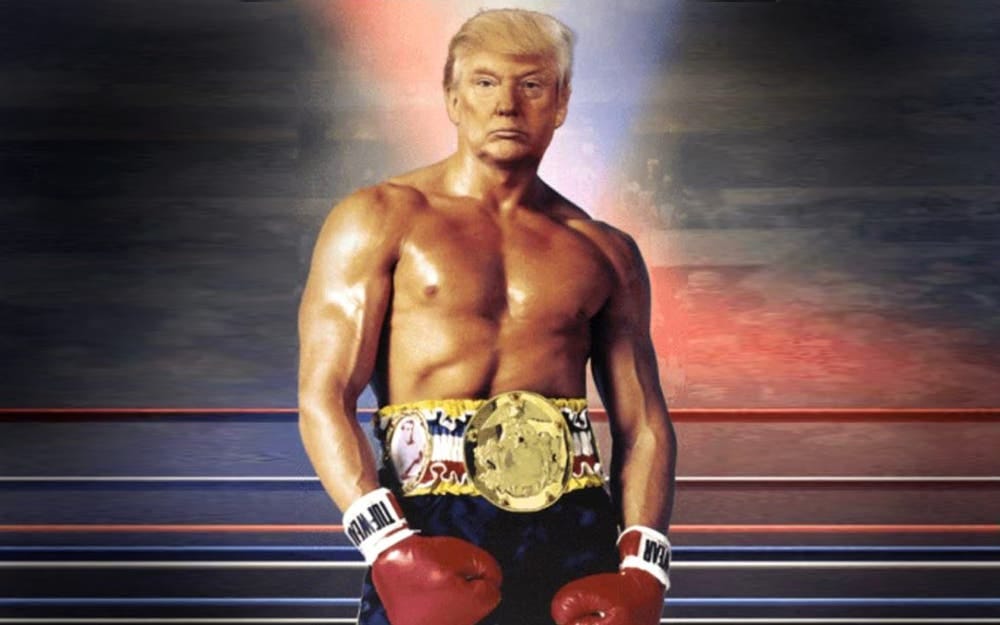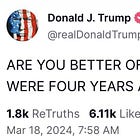"Old, alone, done for"
How Dr. Hook's downfall explains the suddenly enfeebled Donald Trump
Welcome to the weekend edition of The Experiment, your official hopepunk newsletter. If you’d like to support my work, become a paid subscriber or check out the options below. But even if you don’t, this bugga free. Thanks for reading!
The TV with the built-in DVD player was in my bedroom, so that is where my oldest son, then perhaps only four or five, would sit with me on my bed and watch Peter Pan’s epic battle with Captain Hook. None of that cartoon life for me. Ours was the 2003 live action movie in which Jason Isaacs played both Hook and Mr. Darling, and Jeremy Sumpter, who would later make me hate him as J.D. McCoy in Friday Night Lights, gave Pan a gleaming, early-adolescent charisma. Watching and rewatching this movie with my son is easily one of my favorite memories of early fatherhood.
Two decades later, I am in the stage of life where I schedule dental surgeries and colonoscopies, and that son is off in the world finding his fortune. It’s only now that I can see that what I was watching was really a horror film. In the hands of Australian director P.J. Hogan, this Peter Pan embodied the anxiety of aging.
“Proud and insolent youth, prepare to meet thy doom.”
Peter’s rescue of Wendy on the Jolly Roger leads to a mano a don’t-wanna-grow-up-and-be-a-mano confrontation between Hook and Pan, but the movie isn’t called Hook and Pan. The movie is called Peter Pan. When Hook and Pan square off with swords, the younger one flying with all the magical vigor of youth, the older one hindered by past injuries and the weight of age, the fight isn’t just to save Wendy and the Lost Boys. The fight is about whether Pan will conquer his demons in the person of the menacing Capt. Hook.
This movie is about who Peter Pan is, the fight between age and youth, and the latter’s inevitability into becoming the former, and how in doing so time swallows us all whole. Peter Pan is a story about our doom.
“So Peter Pan. This is all your doing,” parries Hook.
“Aye James Hook. It’s all my doing.”
“Proud and insolent youth, prepare to meet thy doom.”
At first the fight goes about as well as you can expect it to go for a cocky kid who can fly against an old bastard who can’t, though Hook holds his own, even calling off his pirates when they join the fight on his side. “Leave him! He’s mine!”
“Me? Tragic?”
Capt. Hook, never above fighting dirty, snares Tinkerbell and shakes some of that fairy dust on himself. The movie leaves unstated what happy thoughts Capt. Hook uses to fly. Hook quickly gains the upper hand by sapping Pan’s confidence with insults and dystopian world building.
“Not bad for an old man,” says Peter.
“I know what you are.”
“I’m the best there ever was.”
“You’re a tragedy!”
“Me? Tragic?”
Yes, you, Peter. I almost want to spare him from what Hook says next.
“She was leaving you, Pan. Your Wendy was leaving you,” says Hook. “Why should she stay? What have you to offer? You are incomplete. She’d rather grow up than stay with you. Let us now take a peep into the future. What’s this I see? ‘Tis the fair Wendy. She’s in her nursery. The window is shut.”
“She can’t hear you.”
Pan’s afraid now. Hook knew just how to scare him.
“I’ll open it!”
“I’m afraid the window’s barred.
“I’ll call out her name.”
“She can’t hear you.”
“No,” whines Pan.
“She can’t see you.”
“Wendy!”
“She’s forgotten all about you.”
“Stop! Please! Stop it!” Peter’s confidence is gone. He sounds like a scared child.
“And what is this I see?” asks Hook. “There is another in your place. He is called husband.”
I remember how Isaacs’ disdainful line reading of “husband” unsettled me. That Isaacs played both the malevolent Hook and Mr. Darling, the embodiment of simpering ineffectiveness, seemed to implicate me. The scary thing here is that Wendy will settle for you in domesticity, her wild streak reduced to a bedtime story she tells your children. You may take Pan’s place, but in doing so you close her off to real happiness.
“There is another in your place. He is called husband.”
And then Hook goes in for the kill. “You die alone and unloved. Just like me.”
Peter Pan is beat, and he knows it. Tears in his eyes, he swings wildly at Hook, who brushes aside the attack and then, with a mighty overhead blow, knocks Peter to the deck where he lands with a thud.
Hook knows he doesn’t get a happy ending. “You’ll die alone and unloved. Just like me.” If you’d have asked me back then if I were happy, if my marriage would survive, if I would have a happy life, I would have tried to make you believe the answer to those questions was yes, of course, look at all that my happy life has. But I still remember how I felt when Capt. Hook said “husband.”
***
After reading last weekend’s essay on the new kind of American masculinity, my friend Elise Hu texted me a link to Celeste Davis’s newsletter. “Great read related to what you were posting about this week,” texted Hu. Davis posits that there are men who like women and men who don’t, and women can tell which is which. Davis cites a lot of examples of men who do and don’t in her life, but it all boils down to this: Do you think women are real people or nah?
Let me give you an example: When my current wife first started showing up at conferences for political consultants, it was as my plus one, and she hated being introduced as “Jason’s lovely wife.” After she took over my business and I went off to find fame and fortune in public service, some of my former colleagues kept treating her like my lovely wife and not a fellow political consultant even though she turned my company into a far more successful version of it than I ever did. And if I joined her at those conferences, this time as her plus one, many of those former colleagues would still refer to her as “Jason’s lovely wife,” and that was when they bothered to acknowledge her presence. It was common for them to direct all questions to me, the guy who’d been out of the game for a decade, and ignore her, the industry leader.
“There’s nobody that has more respect for women than I do.”
Davis reached a horrifying conclusion when she noticed that the more successful men in her social sphere were the ones who didn’t like women and that it was the respect of men that was necessary to maintain their status.
But the unfortunate truth is… successful men have little reason to care if they are perceived as someone who likes women. How they treat women has little to no effect on a man’s career, monetary success, popularity or reputation. …The sad truth is that men don’t NEED to like or respect women to successfully walk through the world. Not at all. … In order to be a hero in our world, in order to be labeled a good man, in order to be successful, treating women well is simply not a requirement.
A system that benefits men who don’t like women is vulnerable to exploitation by the likes of Donald Trump, who has been adjudicated guilty of sexually assaulting a woman and then lying about it repeatedly by claiming she wasn’t good-looking enough to rape. When his daughter Ivanka was 16, he asked of another, “Don’t you think my daughter’s hot? She’s hot, right?” In 2004, he told shock jock Howard Stern it was OK to refer to her as “a piece of ass.” The man is a caricature of not treating women as people: “horseface” Stormy Daniels, Megyn Kelly’s “blood coming out of her wherever,” grabbing them by the you-know-what, and the 18 women who have publicly accused him of sexually inappropriate behaviors, including unwanted groping and forced kisses.
Perhaps Trump’s dominance of the Republican Party has not come in spite of this. In fact, this man who treats women like sexual ego Spanx is regarded as powerful and dominant. “There’s nobody that has more respect for women than I do,” said Trump in 2016, saying something that someone with evident respect for women would never have to say. And yet Trump, who is someone women need to be protected from, has effectively cast himself as the protector of women.
His insults were part of it. “Crooked” Hillary. “Little” Marco Rubio. “Lyin’” Ted. Like Hook painting a picture in Pan’s mind’s eye of a domesticated Wendy locked away from him, Trump told us of American carnage, and Democrats answered by adding onto the story of withering democracy and dawning fascism. There was proof enough, to be sure. See, we told you! said the Democrats. “I alone can fix it!” said Trump.
***
Hook’s downfall was a show of mercy. Wendy tricked him into letting her kiss a prone and defeated Pan. “This belongs to you,” she whispers into Pan’s ear, “and always will.” Pan starts glowing, a bright pink. And then he smiles.
“Brace yourselves, lads,” says one of the boys.
“Split my infinitives!” says a surprised Hook.
Consumed by the energy from Wendy’s hidden kiss—you could even call it joy, if you like—the moribund Pan spins and shoots up into the rigging where he and Hook resume battle.
“No, I have won!” whines Hook.
“You are old,” answers Pan, confidence restored in his voice.
“But I won!”
“But I won!”
“And alone.”
“I won! I won! I…”
Hook is no longer thinking happy thoughts. He’s scrambling in mid-air, trying to maintain altitude over the gaping mouth of Tick-Tock, the crocodile who took his hand. The malice that powered his rise into dominance had been defused. The insults that clouded the mind of his rival no longer worked.
“Old, alone … done for.”
As Hook drops neatly into Tick-Tock’s belly, we hear the cheers of Wendy and the Lost Boys and the ticking of the clock. Even in victory, the ticking never stops.
***
A month ago, Tim Walz was just a little-known midwestern governor who was thought to be at the bottom of Kamala Harris’ VP shortlist, but he changed, well, everything with what he said on MSNBC. “You know there's something wrong with people when they talk about freedom: freedom to be in your bedroom, freedom to be in your exam room, freedom to tell your kids what they can read. That stuff is weird,” said Walz.
Without that we might not be focused on freedom right now. If Walz hadn’t dismissed creeping Christian nationalism and authoritarianism as “weird,” then we still might be treating Trump like a larger-than-life movie villain. So many had cowed in his shadow—Congress, the Republican Party, editorial boards—that he seemed bigger and more powerful than he really was. We forgot that most Americans don’t like him and don’t want him to be president. He is, old, alone, done for, and no amount of pancake bronzer can conceal his infirmities now.
The weird thing was part of it, and much smarter and better informed things have been written about it by others. But we have to note how weird destroyed Trump as a political insult comedian. “He is weird,” Trump said of Walz. “He’s weird, I’m not weird, he’s weird. No, he’s a weird guy, he’s a weird dude.” As George Lakoff has observed, “When you argue against someone on the other side using their language and their frames, you are activating their frames, strengthening their frames in those who hear you, and undermining your own views.” It’s a weird world, and Trump is just walking through it.
“He’s weird, I’m not weird, he’s weird. No, he’s a weird guy, he’s a weird dude.”
He’s flailing about, failing to goad Kamala Harris into calling him a racist by acting like a ginormous racist, intentionally mispronouncing her name, insinuating she didn’t previously identify as Black, even reposting an imagine on social media of her as a dung beetle in blackface astride a coconut. And after bombing with several nicknames—“Lyin’ Kamala,” “Crazy Kamala,” “Kamabla,” and “Kamala Krash”—he’s settled on Comrade Kamala while admitting, “I really didn’t find one with her.”
Trump’s meanness that worked for him for so long suddenly hasn’t just stopped working. Now that his opponent is a younger, happy, biracial Black woman whose beauty seems to unsettle him, everything that used to work for him now weighs him down. He’s easily mockable. “I get, I don't agree with, but I get #ComradeKamala,” said comedian Bill Maher, “but #TamponTim?!”
Weird has restored the political comedy timeline. Co-hosting The Pivot with Kara Swisher, Mike Birbiglia was asked to comment on the Harris/Walz campaign’s use of comedy and why it seemed effective.
“I think in comedy, typically a joke has a setup and a punchline and a setup is something that we all agree to be true. And the punchline is a left turn that we don't see coming,” he said. “And I think the problem with political comedy in everything year 2016 on is that we don't all agree on what is true.”
Broadly speaking, we can agree that a man like JD Vance who seems strangely focused on women as birthing agents is weird. That strikes enough of us as self-evidently true that it seems to establish an agreed-upon truth that—Hey, what do you know?—women are people, too. Yes, even the ones with cats. Yes, even the ones who don’t have kids of their own but who help raise their husband’s. Yes… you know what, let’s just say JD Vance singlehandedly made sexism look sillier than a naked man getting out of a cold lake and leave it at that.
The scales of fear having fallen thusly, it’s easier to see now that Trump has turned into a plodding punchline of a man. He’s flopping about on abortion, giving everyone something to detest, and jacking the gender gap into historic heights. And the more he tries to appease women on abortion, the more he makes abortion relevant to younger women voters who are registering to vote in droves.
Suddenly not liking women carries a cost, and being a woman has benefits. As Maher—yes, I can’t believe I’m referring to him again either—recently noted, Republicans have always been the Daddy Party here to protect you and punish others, and Democrats are the Mommy Party full of compassion and concern for health care and education.
“You know what happens when Daddy’s a useless piece of crap? Mom has to take over.”
“But Republicans really aren’t the Daddy Party anymore. They’re more like the Absentee Father Party,” said Maher. “And you know what happens when Daddy’s a useless piece of crap? Mom has to take over.”
Or in this case, Momala. It is too soon to tell whether this represents a basic shift in the power structure to benefit people who like women or, more likely, a brief and advantageous shifting of probabilities and contexts that expose Trump in a way that benefits Kamala Harris. It’s like the odds in blackjack shifting away from the casino, maybe just for a moment. We may “exist in the context of all in which you live and what came before you,” but the context of exactly right now has shifted for Democrats, united in joy. The context has also shifted for Trump, who is disoriented and increasingly incoherent, posting about conspiracies and making threats all day on social media while all the kids chant “weird” at him and laugh.
Donald Trump is still Capt. Hook, but Capt. Hook isn’t as scary when all the kids are pointing and laughing, when you’re reduced to insisting that you won while you’re losing, when the word “weird” zaps all your powers to demean and hurt anyone. Capt. Hook isn’t as scary when pirates are afraid of children and Wendy can mess you up with a smile. Donald Trump is Capt. Hook at the end, flapping about, trying to stay aloft, but soon enough he’s about to fall out of his own coconut tree and fall into the crocodile’s mouth.
Time comes for us all. It’ll come for me, and it’ll come for you. Trump can hear the ticking over the mocking chants of the children. His ability to command the conversation with insults and lies has expired. His time is up. He is old, alone, done for.
But we are not, and though our fears felt real, Capt. Hook was wrong, and so is Trump. These jokers are only dangerous when you take them seriously because they make you believe that things really are doomed. There can be something better. There can always be something better. A fella can be happy, too. In the end, Peter and Wendy fly the Jolly Roger back to London where the Lost Boys all find loving homes with the Darlings. Peter Pan and Tinker Bell return to Neverland because, well, that is their home, but the Darling household, overstuffed though it may be, has never been happier.
Capt. Hook lost because he fought for an ending where Peter, Wendy, and all the boys died alone and unhappy “just like me.” But like Wendy’s kiss, Kamala’s joy and Walz’s weird have made a new outcome possible. Because this movie isn’t about Donald Trump but about us and whether we can put him in the past. We might even get a happily ever after. I know I did.
Jason Stanford is a co-author of NYT-best selling Forget the Alamo: The Rise and Fall of an American Myth. His bylines have appeared in the Washington Post, Time, and Texas Monthly, among others. Follow him on Threads at @jasonstanford, or email him at jason31170@gmail.com.
Further Reading
The New American Manhood
Welcome to the weekend edition of The Experiment, your official hopepunk newsletter. If you’d like to support my work, become a paid subscriber or check out the options below. But even if you don’t, this bugga free. Thanks for reading!
Death and Taxes
Welcome to The Experiment, the weekly newsletter where we’re finding our way through the Uncertain Now. This week, the debate forced me to stop thinking of Donald Trump as an aberration and to accept him as our reality. A former colleague, Thema Thomas
We set up a merch table in the back where you can get T-shirts, coffee mugs, and even tote bags now. Show the world that you’re part of The Experiment.
We’ve also got a tip jar, and I promise to waste every cent you give me on having fun, because writing this newsletter for you is how I have fun.
Buy the book Texas Lt. Gov. Dan Patrick banned from the Bullock Texas History Museum: Forget the Alamo: The Rise and Fall of the American Myth by Bryan Burrough, Chris Tomlinson, and myself is out from Penguin Random House. The New York Times bestseller is out in paperback now!









Terrific article. Thank you.
This is terrific.